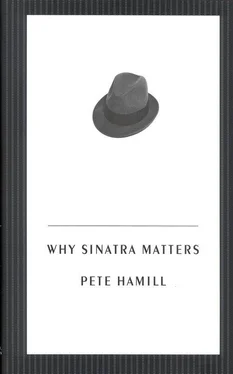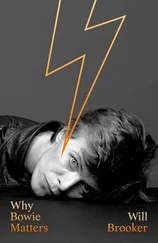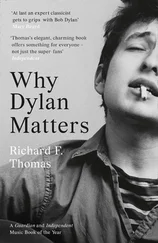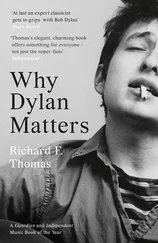Sinatra went on to win the Academy Award for best supporting actor. His records began selling. He appeared before large crowds in New York, Miami, and Las Vegas. Offers arrived every day for television shows and movie roles. But it took him a long time to get over Ava Gardner. She had decided to live in Europe, and he followed her to London and Spain, sometimes begging for a reconciliation that never happened. Back at home, without hope, the wounds slowly healing, he transformed himself into the Sinatra who wore a hat. The swinger whose best friends were men. The man with a lot of women, which was, of course, like having no woman at all. The message was there in the music, the attitude, even the hat: he had come through a hard, dark time, and he wasn’t ever going back to the darkness.
But some of the hardest times in life never completely end. The only time I ever met Ava Gardner was in 1974. A mutual friend took me to see her. She had been drinking and kept whacking a small dog with a rolled-up tabloid newspaper. She was staying at Frank Sinatra’s apartment in the Waldorf-Astoria.
V. By the mid-1950s Sinatra was expressing the feelings and yearnings of men. And they were listening. Most Americans love stories of redemption, of course, but men identify more often with the tale of the return of the hero, the man who comes back wearing the scars of battle, harder and wiser than he was when he left. Looking at, or listening to, Sinatra, particularly after the release of the masterful album called In the Wee Small Hours, men changed their attitude about Frank Sinatra. They identified with the personal drama of the Fall, with the cliché of the hero led astray by the vixen and his eventual release from her wiles. Or they embraced another cliché he had paid his dues. At last. Such men once believed that everything had been too easy for Frank Sinatra. But now he had paid for his good luck and his endless hubris in the ways they had paid: with anguish and suffering and loss.
Even some of the old soldiers forgave him. The Korean War had confused all notions of the nobility of serving your country; it was an undeclared “police action,” without a Pearl Harbor, and deepened the cynicism of many men. The fighting was ended in 1953 by the new president, Dwight Eisenhower, who knew as a general that it was folly to fight a land war in Asia. The men seemed to say, Don’t trust history, trust only the personal. And for many men, the personal involved a merging of reality and fiction. In war or peace, they all knew men like Maggio.
On the records, the voice was deeper, richer, with more timbre, the voice of a man. But it also had a newer attitude. In the ballads, most of them torch songs, he was protected now with the armor of the stoic. The songs from In the Wee Small Hours said that in spite of loss, abandonment, defeat, he — and you — could get through the night. You could still get hurt, but it was worth the risk because you knew that no defeat was permanent. There would be another day, a new woman, another chance to roll the dice. There was rue in some of the songs. There was regret. There was no self-pity.
“Ava taught him how to sing a torch song,” said Nelson Riddle many years later. “She taught him the hard way.”
Everything that flowed from the comeback — the Rat Pack, the swagger, the arrogance, the growing fortune, the courtiers — is, in the end, of little relevance. It has as much to do with Sinatra’s art as Hemingway’s big-game hunting had to do with his. For a while Sinatra appeared to be the only man in America who could not be hurt again. Not ever. Onstage he exuded power and confidence; even the shadow of the Mob helped his image because it added a dangerous glamour to the performance and a dark resonance to his art. He made some good movies after the comeback: The Man with the Golden Arm, Pal Joey, Some Came Running, High Society, and The Manchurian Candidate. He also made some appalling, self-indulgent junk. But he simply didn’t take acting seriously enough to become a great actor. Too often he settled for the first, most superficial take, avoiding the effort that would force him to stretch his talent, acting as if he were double parked. Too often, in too many movies, he cheated the audience and cheated himself. He never cheated in the music.
In the end, his most durable expression lies in that music. While living his life, Sinatra had learned something about human pain and found a way, through his music, to turn that hard-won knowledge into a form of human consolation. As the country changed, and the music along with it, as rock and roll took over and the baby boomers sneered at the children of Prohibition and the Depression, he was often baffled about the world and his role in it. But he continued practicing his own consoling art until the words and music could no longer rise from him into the trembling air.
Before leaving the stage, Sinatra had come to realize that life was not one long string of triumphs. As he grew older, he sometimes even floundered in the music (he made an entire album of songs based on Rod McKuen’s ninth-rate poetry). But even his slumps did not last long. He could always find his way home to the music that had lasted him a lifetime, and almost until the end, he was capable of surprise. To be sure, much of what he did in life was also predictable. Watching the disorder and chaos of the sixties, his politics changed. But then, he was not the only old New Dealer who moved to the right, where he embraced Richard Nixon, a man he detested, and Ronald Reagan, a man he enjoyed. During that period of disorder he married and divorced Mia Farrow, who was thirty years his junior, and came away baffled at himself. “I still don’t know what that was all about,” he said to me a dozen years after it had ended. With his fourth wife, Barbara Marx, he retreated deeper into the bright, ritualized fortress he had erected in the California desert, far from the places that had hurt him into art. And I remember now a night I spent with him in 1974, driving around New York in a limousine, just talking.
“It’s sure changed, this town,” he said. “When I first came across that river, this was the greatest city in the whole goddamned world. It was like a big, beautiful lady. It’s like a busted-down hooker now.”
“Ah, well,” I said. “Babe Ruth doesn’t play for the Yankees anymore.”
“And the Paramount’s an office building,” he said. “Stop. I’m gonna cry.”
He laughed and settled back. We were crossing Eighty-sixth Street, heading for Central Park.
“You think some people are smart, and they turn out dumb,” he said. “You think they’re straight, they turn out crooked.” This was the Watergate winter. The year before, Sinatra, the old Democrat, sat in an honored place at the second inauguration of Richard Nixon; the Watergate tapes would reveal a Nixon who retailed crude anti-Italian slurs. “You like people,” Sinatra said softly, “and they die on you. I go to too many goddamned funerals these days. And women,” he said, exhaling, and chuckling again. “I don’t know what the hell to make of them. Do you?”
I said that every day I knew less.
“Maybe that’s what it’s all about,” he said. “Maybe all that happens is, you get older and you know less.”
I liked the man who talked that way on a chilly night in New York. I liked his doubt and his uncertainty. He had enriched my life with his music since I was a boy. He had confronted bigotry and changed the way many people thought about the children of immigrants. He had made many of us wiser about love and human loneliness. And he was still trying to understand what it was all about. His imperfections were upsetting. His cruelties were unforgivable. But Frank Sinatra was a genuine artist, and his work will endure as long as men and women can hear, and ponder, and feel. In the end, that’s all that truly matters.
Читать дальше












